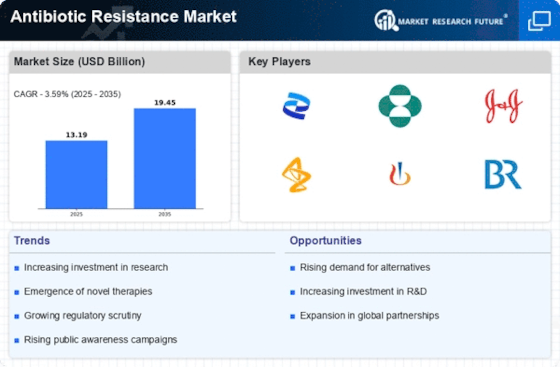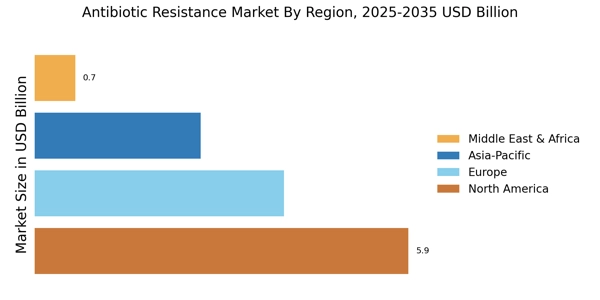Emergence of Alternative Therapies
The search for alternative therapies to combat antibiotic resistance is gaining momentum, significantly impacting the Antibiotic Resistance Market. As traditional antibiotics become less effective, researchers are exploring various innovative approaches, including bacteriophage therapy, antimicrobial peptides, and vaccines. These alternatives hold promise in treating resistant infections and are attracting considerable interest from both the scientific community and investors. The potential for these therapies to complement or replace conventional antibiotics could reshape treatment paradigms and drive market growth. Furthermore, the increasing incidence of multi-drug resistant organisms is likely to accelerate the development and adoption of these alternative strategies within the Antibiotic Resistance Market. As the landscape of infection treatment evolves, the focus on alternative therapies may provide new avenues for addressing the challenges posed by antibiotic resistance.
Government Initiatives and Funding
Government initiatives aimed at combating antibiotic resistance are playing a crucial role in shaping the Antibiotic Resistance Market. Various countries have established national action plans that prioritize research, surveillance, and the development of new antibiotics. For instance, funding allocated for antibiotic research has seen a notable increase, with some governments investing millions to support innovative projects. This financial backing not only stimulates research and development but also encourages collaboration between public and private sectors. As a result, the Antibiotic Resistance Market is likely to experience accelerated growth, driven by the influx of resources dedicated to addressing this pressing public health challenge. The commitment from governments to tackle antibiotic resistance is expected to yield significant advancements in treatment options.
Technological Innovations in Diagnostics
Technological advancements in diagnostic tools are emerging as a key driver in the Antibiotic Resistance Market. Rapid and accurate diagnostic tests enable healthcare providers to identify resistant infections more effectively, facilitating timely and appropriate treatment decisions. The integration of advanced technologies, such as molecular diagnostics and point-of-care testing, is transforming the landscape of infection management. These innovations not only improve patient outcomes but also contribute to the prudent use of antibiotics, thereby addressing the issue of resistance. As diagnostic capabilities continue to evolve, the Antibiotic Resistance Market is likely to expand, with a growing emphasis on developing companion diagnostics that can guide antibiotic therapy. This trend underscores the importance of technology in combating antibiotic resistance.
Increased Awareness and Education Initiatives
There is a growing recognition of the dangers posed by antibiotic resistance, which is significantly influencing the Antibiotic Resistance Market. Public health campaigns and educational initiatives are being implemented to inform both healthcare professionals and the general public about the responsible use of antibiotics. This heightened awareness is expected to lead to a reduction in unnecessary prescriptions, thereby creating a demand for more effective and targeted antibiotic therapies. Furthermore, educational programs are encouraging the development of new treatment modalities, including phage therapy and immunotherapy, which could potentially reshape the Antibiotic Resistance Market. As awareness continues to grow, it is anticipated that the market will evolve to meet the changing needs of healthcare providers and patients alike.
Rising Incidence of Antibiotic-Resistant Infections
The increasing prevalence of antibiotic-resistant infections is a primary driver of the Antibiotic Resistance Market. According to recent data, antibiotic resistance contributes to approximately 700,000 deaths annually, a figure that could rise to 10 million by 2050 if no action is taken. This alarming trend compels healthcare systems to seek innovative solutions, thereby driving demand for new antibiotics and alternative therapies. The urgency to address this crisis has led to heightened awareness among policymakers and healthcare providers, fostering an environment conducive to investment in research and development. As a result, the Antibiotic Resistance Market is witnessing a surge in funding aimed at combating resistant pathogens, which is likely to shape the future landscape of antibiotic therapies.

















